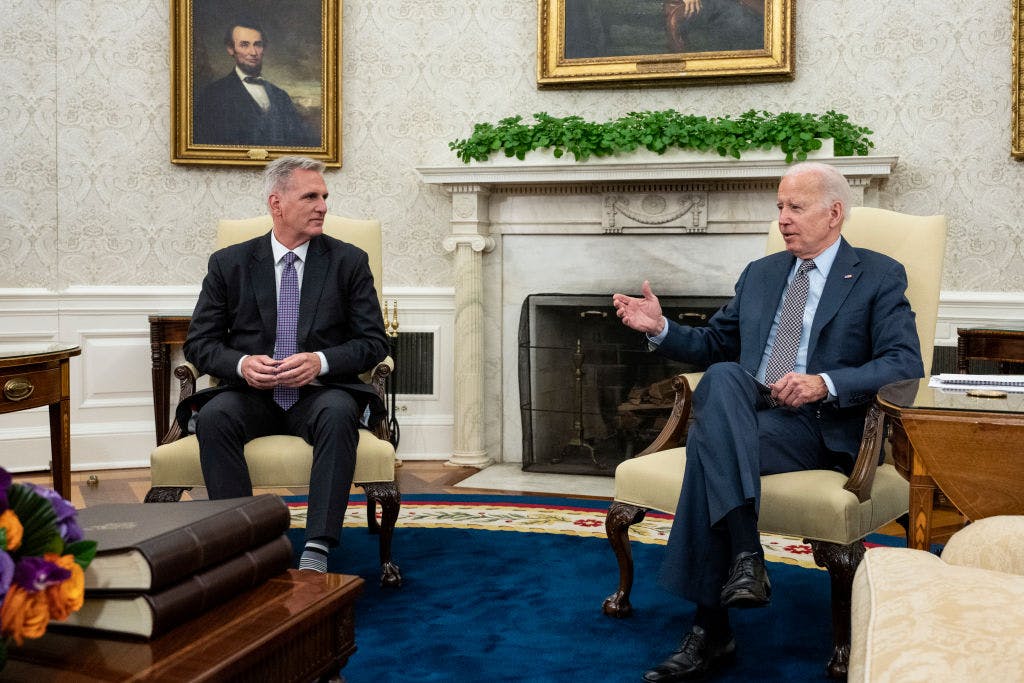Could Fitch’s Downgrade of America’s Debt Open a Door to Monetary Reform?
Easy money, courtesy of the Federal Reserve, has pushed the national debt past the $32 trillion mark, a challenge that the House GOP sought to address during the negotiations over the debt ceiling.

Of all the abject falsifications that tumble out of the White House these days, the effort to pin the downgrade of America’s debt on the GOP and the Trump administration is one of the most ridiculous. Not that there’s a total absence of blame to go around in respect of the nation’s fiscal health — including the Fed. Yet the spending which is precipitating all this trouble has to be laid primarily at the feet of the Democrats.
The debt crisis won’t end until the spending addiction ebbs. That isn’t stopping Mr. Biden and his camarilla from trying to blame the downgrade on “the last administration and reckless actions by congressional Republicans,” as an unnamed “senior” official told Reuters. The White House looks to be in denial. Instead of using the downgrade by ratings agency Fitch as a moment to address the debt crisis, Mr. Biden & Co. go after the messenger.
“Bizarre and baseless” is what they call the downgrade. Detachment from economic reality has long been a hallmark of national politics. The federal budget is on an unsustainable course, partly enabled by the Federal Reserve holding “more than $7 trillion in bonds,” David Malpass notes. This enables “Washington’s deficit spending by holding down bond yields, blurring the line between fiscal and monetary policy.”
A “slow-motion fiscal train wreck” is how Mr. Malpass describes it, as easy money pushed the national debt past the $32 trillion mark, exceeding the economy’s annual output by some 20 percent. This is the challenge that the Republican majority in the House sought to address during the negotiations over the debt ceiling. They were skewered by the liberal press and Mr. Biden, who initially refused even to discuss the idea of spending trims.
Fitch points to “a steady deterioration in standards of governance” on “fiscal and debt matters” as drivers of the debt downgrade. Add to that list a debased currency. It hardly bolstered confidence in the integrity of America’s finances that Mr. Biden, during the debt ceiling debacle, eyed an end run around the Constitution’s separated powers and using the 14th Amendment as justification to unilaterally borrow money on America’s credit.
The invocation of the 14th Amendment — enacted by Congress and ratified by the States to ensure that America’s obligations were repaid in full, and at their gold value — served as a reminder during the debt crisis of the collapse in value of the dollar as measured in the monetary metal. The dollar has shed some 98 percent of its value since President Nixon closed the gold window in 1971. That default is the subtext of the debt downgrade.
Congressional Democrats ignore this in their zeal to gore the GOP. Senator Whitehouse imagines “a straight line from Republicans’ manufactured debt crisis to Fitch’s downgrade.” Senator Schumer has the gall to urge the GOP “to learn from their mistakes and never push our country to the brink of default again.” Talk about no good deed going unpunished, if this is the GOP’s thanks for admitting the laws of economics.
We get that while President Trump and the GOP deserve credit for pushing through tax cuts during his term, they failed to capitalize on control of Congress to make headway on the runaway spending that now threatens our future. To Mr. Trump’s credit, though, at least he offered a coherent solution for the looming problem of entitlement costs. In lieu of the usual menu of benefit cuts or tax hikes, Mr. Trump’s answer was higher growth.
The best way to view the current moment, courtesy of Fitch, is an invitation for Congress to embrace not only the need for fiscal restraint, but for monetary reform. This is what we take from Mr. Malpass’ piece this afternoon in the Wall Street Journal, in which he underscores the monetary dimension to the debt crisis. In our view this issue needs to be lifted up to Congress by the establishment of a monetary commission to address the need for a sound dollar defined in terms of gold or other specie.
________
This editorial has been revised from the bulldog, primarily to take note of the op-ed piece by Mr. Malpass in the Wall Street Journal.

